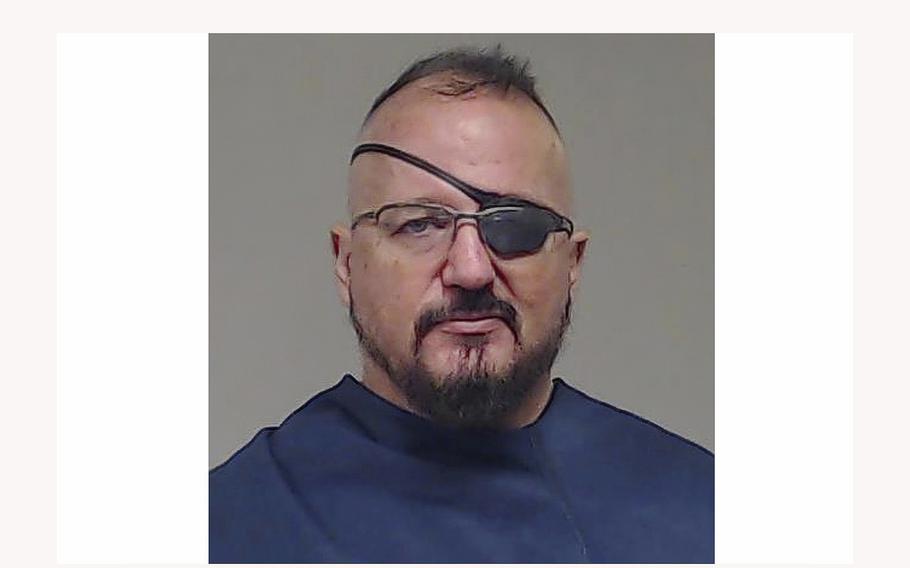U.S.
Secret Service reached out to Oath Keepers before Jan. 6 riot
The Washington Post October 13, 2022

Oath Keepers founder Stewart Rhodes (Collin County Sheriff’s Office)
WASHINGTON - The founder of the Oath Keepers and other leaders of the self-styled militia organization were in contact with Secret Service officials multiple times in late 2020 and leading up to the attack on the U.S. Capitol on Jan. 6, 2021, according to an agency official and court testimony in Stewart Rhodes's ongoing seditious conspiracy trial.
A former member of the Oath Keepers testified last week that Rhodes, the group's founder, claimed to be in touch with someone in the Secret Service in the months before the riot. A Secret Service official confirmed that members of the agency's protective intelligence division reached out to the Oath Keepers in advance of protests in Washington in November and December as well as the Jan. 6 "Stop the Steal" rally.
Agents regularly engage in such advance contact with protest groups expected to attend public presidential events, the official said. The goal is to explain what items are prohibited and learn more about the protesters' numbers and plans to assess the risk to protected officials.
Rhodes and four associates are now in the midst of a trial expected to last at least a month, in which they face the most serious charges of the criminal investigation into the Capitol riot. Jurors have heard evidence that prosecutors say shows the Oath Keepers wanted to keep Donald Trump in power by force, trial testimony that comes just as the House committee investigating Jan. 6 prepared for what is expected to be its final public hearing Thursday.
The House committee is expected to highlight Secret Service records indicating Trump received multiple warnings on Jan. 6 about rising danger at the Capitol yet continued to insist on traveling there himself, according to people briefed on the records, who spoke on the condition of anonymity to discuss sensitive internal records.
The full extent of what intelligence the Secret Service received from the Oath Keepers is unclear.
John Zimmerman, a former Oath Keeper from North Carolina, testified that he believed Rhodes talked to a Secret Service agent in September 2020 about what weapons they could be carrying while "working" a Trump rally in Fayetteville, N.C. In response to that testimony, a Secret Service spokesman said that "it is not uncommon for various organizations to contact the agency concerning security restrictions and activities that are permissible in proximity to our protected sites."
Veteran D.C. protesters say they rarely deal with the Secret Service compared with other agencies.
"Out of all of the demonstrations I ever planned in D.C. over the past 15 years, the one agency I've had the least amount of interaction with is the Secret Service," said Robby Diesu, who has organized protests for various progressive causes.
But most D.C. protests don't involve organized armed groups known for advocating violent resistance to government authority.
A D.C. police lieutenant was put on leave for his contacts with longtime Proud Boys chairman Henry "Enrique" Tarrio, who is set to go on trial in December on charges similar to those faced by the Oath Keepers. The same lieutenant also reached out to a man he believed led a white-supremacist group. Experts said it makes sense for law enforcement personnel to seek information from extremist groups but that interactions must be handled with care to avoid misinterpretation.
Rhodes and other Oath Keepers have argued that they were regularly in touch with law enforcement and left their firearms outside D.C. because they had no intention of breaking the law on Jan. 6. In multiple encrypted chat conversations before the riot, Rhodes expresses hope that Trump would invoke the Insurrection Act, which he argued would "nullify" D.C. gun laws and all other restrictions on violent behavior.
"I have to try to get Trump the message on the necessity of him waging war on the enemy NOW while still President and Commander in Chief," he wrote to one group of Oath Keepers on Dec. 14, 2020. He said he had stayed in D.C. to press the president, had "passed that message on through one contact" and was "working on others."
Rhodes was in contact with Roger Stone, a close confidant of the former president who was guarded by Oath Keepers on the morning of Jan. 6. Stone denies any involvement in the riot; he is also expected to be a focus of Thursday's House committee hearing.
Trump never called on private militias to act as his defense force, and prosecutors argue that the law would not have allowed it. They note that Rhodes repeatedly said that the group would fight Joe Biden with or without Trump's approval.
"He needs to know that if he doesn't do it, we will," Rhodes said of Trump in a Dec. 29, 2020, message read in court. "And if we have to do it ourselves, without him as Commander in Chief, it will be exponentially harder, and many more of us will die."
When members of the Oath Keepers went into a VIP section at Trump's speech on Jan. 6, the Secret Service required them to leave tactical gear outside and go through metal detectors, another former member of the group testified Wednesday.
Former White House aide Cassidy Hutchinson told the House committee earlier this year that Trump wanted the metal detectors removed despite being told members of the crowd were armed.
"They're not here to hurt me," Hutchinson recalled him saying.
The Washington Post's Spencer S. Hsu, Tom Jackman and Ellie Silverman contributed to this report.